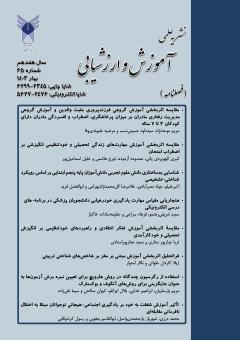فراتحلیل اثربخشی آموزش مبتنی بر مغز بر شاخصهای شناختی تربیتی
فراتحلیل اثربخشی آموزش مبتنی بر مغز بر شاخصهای شناختی تربیتی
محورهای موضوعی : تحقیق
ژیلا کاردان حلوایی
1
*
![]() ,
نگار استوار
2
,
نگار استوار
2
1 - گروه آموزش علوم تربیتی، دانشگاه فرهنگیان، صندوق پستی 889-14665 تهران، ایران.
2 - استادیار گروه روانشناسی، دانشگاه پیام نور، ص. پ. 19395-04697 تهران. ایران
کلید واژه: آموزش مبتنی بر مغز, شاخصهای شناختی تربیتی, فراتحلیل, اندازه اثر,
چکیده مقاله :
امروزه روشهای آموزش مبتنی بر مغز براساس تحقیقات علمی گسترده در مورد نحوه یادگیری مغز، مورد توجه بسیاری از پژوهشگران قرار گرفته است. وجود پژوهشهای متعدد و متناقض در این حوزه لزوم انجام یک فراتحلیل در این حوزه را مورد تاکید قرار میدهد. پژوهش حاضر به روش فراتحلیل و با هدف ترکیب پژوهش های انجام شده در زمینه تاثیر آموزش مبتنی بر مغز بر شاخصهای شناختی تربیتی انجام شده است. جامعه آماری پژوهش شامل مطالعاتی است که در سالهای 1387 تا تابستان 1402 در ایران صورت گرفته و به صورت تمام متن در پایگاههای اطلاعاتی منتشر شده است. براساس ملاکهای ورود و خروج 25 پژوهش و 85 اندازه اثر انتخاب شد که در نهایت پس از تحلیل حساسیت و حذف اندازه اثرهای افراطی 80 اندازه اثر وارد فراتحلیل شد. نتایج نشان داد اندازه اثر ترکیبی برای مدل اثرات تثبیت شده برابر با 08/1 و برای مدل اثرات تصادفی برابر 21/1 است که هر دو معنادار بودند. در این پژوهش، انواع روشهای آموزش مبتنی بر مغز، پیامدهای چندگانه، نوع درس و انواع آزمودنیها به عنوان متغیرهای تعدیل کننده کیفی و کمی مورد بررسی قرار گرفتند. نتایج نشان داد که اندازه اثر خلاصه از همه متغیرهای تعدیل کننده تاثیر میپذیرد. نتایج فرارگرسیون نیز نشان داد که اندازه اثر تابع تعداد جلسات مداخله و سن آزمودنیهاست و آموزش مبتنی بر مغز در تعداد جلسات بیشتر و در سنین کم (دوره ابتدایی) موثرتر است. با توجه به نتایج فراتحلیل حاضر، ارائه برنامه-هایی در راستای پیادهسازی آموزش مبتنی بر مغز در نظام آموزشی ضرورتی است که باید بیش از پیش مورد ملاحظه قرار گیرد.
Nowadays, the methods of brain-based education based on the extensive scientific research on how the brain learns, has been mostly considered by many researchers. The numerous and contradictory studies in this subject emphasize the need to conduct meta-analysis. The present study has been conducted by the meta-analysis method and with the aim of combining the conducted research in the field of the brain-based education’s impact on the educational cognitive indicators. The population’s research includes the studies that done in Iran from 1387 to the summer of 1402 and published in the databases as the full text. Based on the inclusion and exclusion criteria, 25 studies and 85 effect size selected that finally after sensitivity analysis and removal of extreme effect sizes, 80 effect sizes entered in the meta-analysis. The results showed that the size of combined effect is 1.08 for the fixed effects model and 1.21 for the random effects model; which both of them were statistically significant. In this research, different types of brain-based teaching methods, multiple outcomes, type of lessons and types of subjects were investigated as qualitative and quantitative moderating variables. The results showed that the size of summary effect size affected by all of the moderating variables. The results of the meta-regression also showed that the effect size is a function of the number of intervention sessions, and the subjects' age and the brain-based teaching is more effective in more sessions and at an early age (primary school). According to the results of the present meta-analysis, providing programs in line with the implementation of brain-based education in the educational system is a necessity that should be considered more.
امروزه روشهای آموزش مبتنی بر مغز براساس تحقیقات علمی گسترده در مورد نحوه یادگیری مغز، مورد توجه بسیاری از پژوهشگران قرار گرفته است. وجود پژوهشهای متعدد و متناقض در این حوزه لزوم انجام یک فراتحلیل در این حوزه را مورد تأکید قرار میدهد. پژوهش حاضر به روش فراتحلیل و با هدف ترکیب پژوهشهای انجام شده در زمینه تأثیر آموزش مبتنی بر مغز بر شاخصهای شناختی تربیتی انجام شده است. جامعه آماری پژوهش شامل مطالعاتی است که در سالهای 1387 تا تابستان 1402 در ایران صورت گرفته و به صورت تمام متن در پایگاههای اطلاعاتی منتشر شده است. براساس ملاکهای ورود و خروج 25 پژوهش و 85 اندازه اثر انتخاب شد که در نهایت پس از تحلیل حساسیت و حذف اندازه اثرهای افراطی 80 اندازه اثر وارد فراتحلیل شد. نتایج نشان داد اندازه اثر ترکیبی برای مدل اثرات تثبیت شده برابر با 08/1 و برای مدل اثرات تصادفی برابر 21/1 است که هر دو معنادار بودند. در این پژوهش، انواع روشهای آموزش مبتنی بر مغز، پیامدهای چندگانه، نوع درس و انواع آزمودنیها به عنوان متغیرهای تعدیل کننده کیفی و کمی مورد بررسی قرار گرفتند. نتایج نشان داد که اندازه اثر خلاصه از همه متغیرهای تعدیل کننده تأثیر میپذیرد. نتایج فرارگرسیون نیز نشان داد که اندازه اثر تابع تعداد جلسات مداخله و سن آزمودنیها است و آموزش مبتنی بر مغز در تعداد جلسات بیشتر و در سنین کم (دوره ابتدایی) مؤثرتر است. با توجه به نتایج فراتحلیل حاضر، ارائه برنامههایی در راستای پیادهسازی آموزش مبتنی بر مغز در نظام آموزشی ضرورتی است که باید بیش از پیش مورد ملاحظه قرار گیرد.

